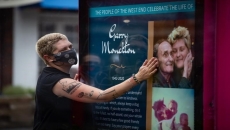Federal officials limited the use of Oxford-AstraZeneca's COVID-19 vaccine Monday while it announced an investigation into reported links to a rare blood clot condition known as VIPIT.
The National Advisory Committee on Immunization says the vaccine should not be used by people younger than age of 55, while Health Canada has issued guidelines around what to look for if you suspect you have had an adverse reaction.
Here’s a look at this rare condition.
WHAT IS VIPIT?
VIPIT stands for: Vaccine-Induced Prothrombotic Immune Thrombocytopenia. According to NACI, it is associated with the development of antibodies that "activate" platelets, which stimulate the formation of blood clots.
HOW DANGEROUS IS VIPIT?
The case fatality of VIPIT is approximately 40 per cent, however that may decrease with increased awareness and early treatment.
HOW COMMON IS THIS ADVERSE REACTION?
It’s not clear how common this happens after vaccination but the European Medicines Agency said March 18 it was originally believed to occur once per 1,000,000 people vaccinated with the AstraZeneca vaccine. However, a higher rate of 1 per 100,000 was reported in Germany.
WHO DOES THIS AFFECT?
So far, cases have largely been among women younger than age 55 and mostly emerged between four and 16 days after vaccination. However, a brief for Ontario’s COVID-19 advisory group notes many European countries used more of their initial AstraZeneca doses in women under age 55, which may have skewed the results.
The provincial science table experts add that VIPIT does not appear to be more common in people who have had blood clots before, have a family history of blood clots, have a low platelets, or pregnant women.
ARE THERE KNOWN CASES IN CANADA LINKED TO THE ASTRAZENECA VACCINE?
No.
WHAT ARE THE WARNING SIGNS?
Experts say to look for the following symptoms between four and 20 days after vaccination: a severe headache that does not go away; a seizure; difficulty moving part of your body; new blurry vision that does not go away; difficulty speaking; shortness of breath; chest pain; severe abdominal pain; new severe swelling, pain, or colour change of an arm or a leg.





